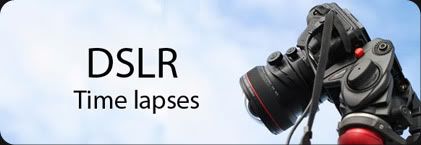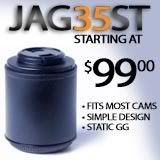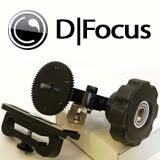
So after watching everyone turn all these cool time lapses with their new Canon 5Dmk2 and 7D's I decided to give it a try. Having some free time on my vacation was really helpful, as doing time lapses or learning to shoot them is time consuming.
So here are the basic things you'll need:
1-DSLR body most any will do, in my case I used a 5dmk2 and a 7d
2-Good lens, any will do but for a good dramatic look, wide angle lenses work best. I used a 16-35mm f2.8L canon.
3-A good tripod, some people will tell you that you need a real true fluid head tripod for video work, if you can afford it, get one, but for time lapses, all you really need is a sturdy tripod that wont move around easily by wind. I used a Manfrotto 756B legs with a 701HDV head that costs about $300
4-And finally a good Timer controller. Canon Has the TC-80N3 for about $140 but I bought a cheapie ebay knock off for $40, worked good for me, not sure if the canon has more features.
If you'll be doing a daytime time lapse then you'll have to set exposure in your camera like you normally do, you can even do auto if you'd like the results, sometimes the camera does a good job exposing correctly. So once you set your framing and exposure then you connect the timer controller and dial in the right settings.
There are 4 main settings: Delay time - Bulb Time - Int. this the time between shots and finally the amount of exposures or pictures.
For daytime timelapses these settings worked for me,
Delay = 0
Bulb = 1
INT = 5
Count = 399
Keep in mind that I was on a moving Ship most of the time so longer exposures and longer times between pictures would not work, longer exposures would create too much blur and longer times between pictures would speed the movement of the ship too much.
For night shots the the settings looked pretty much the same with the exception of the bulb time, this is the time the shutter remains open. For long times I set my camera to Bulb setting and set the remote settings as follows:
Delay = 0
Bulb = 2
Int = 5
Count = 399
Again, keep in mind that these settings were needed because of the moving platform I was on. Longer Exposures will generally give you better results at night and longer times between pictures will speed slow moving objects like stars more, when played back a 24fps. And so after playing with this for a couple of days, this are my first time lapses ever.
If you wanna learn more about what to do once you have your pictures read Philip Blooms blog, I followed his technique here: http://philipbloom.co.uk/2009/10/18/tutorial-on-how-to-turn-your-dslrs-stills-timelapse-into-video/

Subscribe to:
Post Comments (Atom)







13 comments:
they look great! love the port stuff in mazatlan
You also know how to make people rally behind it, obviously from the responses.
I’d have to check with you here. Which is not something I usually do!
Thanks for the useful information.
Everything is very open with a really clear description of the issues.
I think a lot of articles related to are disappearing someday.
This is the right blog. Great stuff you have here, just great! Thankyou!
Best article on this topic. I love your way of writing. Keep it up man.
Please post some more articles on this topic. Thank you for sharing this
I enjoy this kinds of own post. It Like this knowledgeable blog here.
You put very helpful information on this website. Keep it up. Keep blogging.
Looking forward to read your next update, Thanks Nice article you have!
Hi there, You have done an excellent job. Lot will be benefited in this web site.
Post a Comment
Post a Comment
Leave a Message